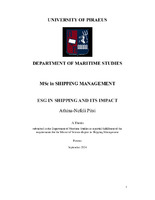ESG in shipping and its impact

Master Thesis
Author
Pitsi, Athina - Nefeli
Πιτσή, Αθηνά - Νεφέλη
Date
2024-09Advisor
Polemis, DionisiosΠολέμης, Διονύσιος
View/
Keywords
ESG ; Shipping policy ; Environmental concerns ; Social concerns ; Governance (ESG) concerns ; Incentives ; Strategy ; ESG decision-making ; Decarbonization activities ; SEEMP ; Social measurements ; European TaxonomyAbstract
In the modern world, firms are required to make adjustments in order to fulfill the ever-increasing need for sustainable development that is based on an ESG (environmental, social, and governance) strategy. The concept of sustainable development has been given a significant amount of attention in policy planning over the last several decades; yet, there have been no defined criteria, indicators, or development frameworks for this concept. As a consequence of this, the assimilation of it into real practices has been quite insufficient. The ESG framework, which evaluates how well a company performs in a number of different categories, is the product of this process. The objective of this piece is to provide evidence that demonstrates why the shipping industry should adopt ESG standards and why doing so is beneficial. To begin, we will provide a definition of sustainable development as well as the concepts of environmental, social, and governance sustainability. After that, we will briefly discuss the factors and developments in the industrial sector that were responsible for shaping these conceptions. Examining the process of developing an environmental, social, and governance (ESG) policy, as well as the primary approaches that shipping companies use and the metrics that are utilized to assess their level of success, is the next stage. Finally, we will investigate whether or not environmental, social, and governance (ESG) is associated with acquiring a competitive advantage, as well as the possible benefits and challenges associated with applying it in the shipping industry.

